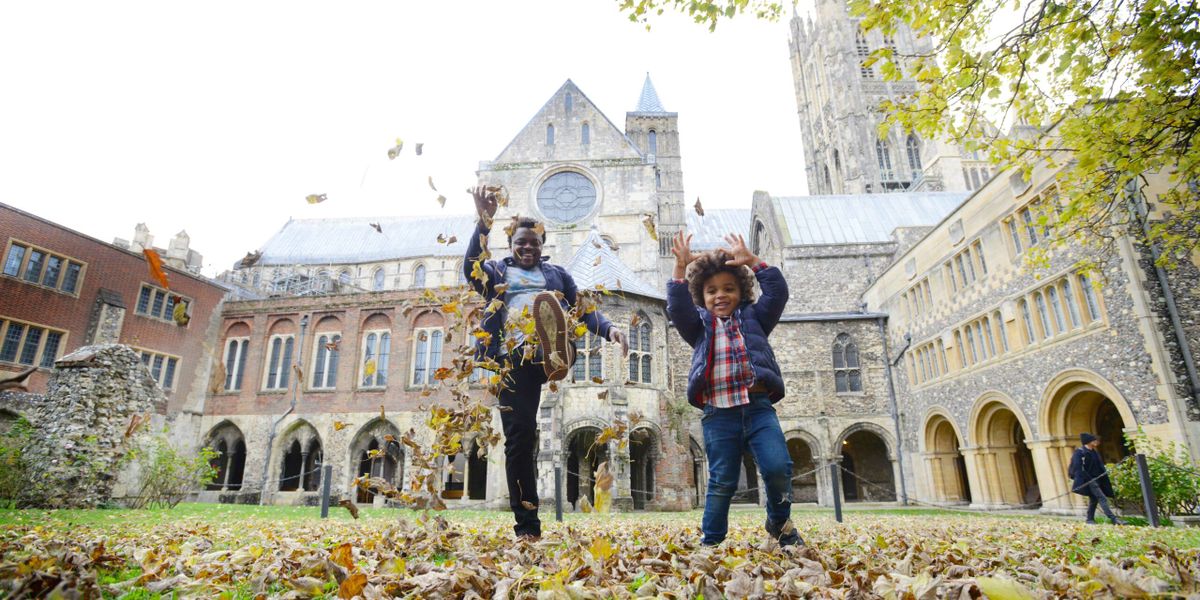- What is your first impression of Julian’s synopsis of her visions?
- How do you understand the nature of visions – are they real or imaginary?
- In what ways is Julian’s illness like a ‘near death experience’ and how is it different?
- What do you make of the focus on blood in Julian’s first vision – chapters 4 and 7?
- How do you feel about the spiritual concept of the littleness of creation and ourselves – chapter 5?
- What does ‘meekness’ mean to you in this context?
- In what ways can Julian’s revelation and text help us in our spiritual life and the issues we face today?
Planning a future visit? Remember to check our opening times and upcoming closures.
Online Book Group: Revelations of Divine Love by Julian of Norwich
Online Book Group: Revelations of Divine Love by Julian of Norwich
Tuesdays (21 May - 30 July), 20:00 - 21:00 BST, via Zoom
WATCH SESSION INTRODUCTIONS
This online book group has now concluded, but you are most welcome to watch Canon Emma's introductions in your own time as you read this wonderful and truly inspiring work of spiritual insight.
Join Canon Emma for her next online book group, where we will read The Book of Margery Kempe (c.1436-8) on Tuesdays, over 10 weeks (starting 10 September), 20:00 - 21:00 BST, via Zoom. Find out more.
Julian of Norwich is one of the most celebrated figures of the English Middle Ages. She is esteemed as one of the subtlest writers and profoundest thinkers of the period for her account of the revelations that she experienced in 1373.
Julian lived as an anchoress in Norwich, and after recovering from a serious illness she described the visions that had come to her during her suffering. She conceived of a loving compassionate God, merciful and forgiving, and believed in our ability to reach self-knowledge despite sin. She wrote of God as our mother and embraced strikingly independent theological ideas for her day.
Together, over nine sessions, we read and discussed the complete text - focussing on specific chapters each week.
We read the Oxford World’s Classic version, translated by the Cambridge scholar Barry Windeatt.
Each week Canon Emma began with a brief introduction followed by an interactive discussion and then concluding with a prayer.
Week One (21 May) - Introduction and the first revelation: Chapters 1 to 9 - Watch session introduction
Week Two (28 May) - Showings of the Cross: Chapters 10 to 21 - Watch session introduction
Week Three (4 June) - Visions of Salvation: Chapters 22 to 29 - Watch session introduction
Week Four (11 June) - All Shall be well: Chapters 30 to 40 - Watch session introduction
Please note, due to family reasons Canon Emma was unable to hold the book groups originally scheduled for 18 June and 2 July. The revised dates were as follows:
Week Five (25 June) - United to God through prayer: Chapters 41 to 50 - Watch session introduction
Week Six (9 July) - The Example of a Lord and a Servant: Chapters 51 to 57 - Watch session introduction
Week Seven (16 July) - Jesus our Mother: Chapters 58 to 65 - Watch session introduction
Week Eight (23 July) - The Final Revelation: Chapters 66 to 72 - Watch session introduction
Week Nine (30 July) – Love was his Meaning: Chapters 73 to 85 - Watch session introduction
For future suggestions of spiritual books for the group to read please email Canon Emma at [email protected]
Online Book Group: Revelations of Divine Love by Julian of Norwich
Session Recordings
These recordings include Canon Emma's introductions for each session, and 'questions to ponder'.
Questions to ponder on (Chapters 1-9):
Questions to ponder on (Chapters 10 to 21):
- How do you understand the nature and purpose of visions?
- What does the cross mean to you?
- How do you respond to imaginatively meditating on the wounding of Christ?
- What does the imagery of blood say to you?
- Why did Jesus have to suffer?
- What do you value about the Eucharist?
- Does the suffering of Christ affect the way you see the suffering of others?
- What will you take away from Julian’s showings into your own life?
Questions to ponder on (Chapters 22-29):
- What is your first impression of these latter showings?
- Why would a forgiving God demand satisfaction?
- How do you understand the word ‘heaven’?
- How do you relate to Julian’s depiction of the wound of Christ?
- How is Mary an icon for the perfect response to God’s love?
- What do you resonate with in Julian’s twelfth revelation of Christ as Saviour?
- Can you think of a time when sin seemed to have a purpose?
- In what ways can Julian’s revelation and text help us in our spiritual life and the issues we face today?
Questions to ponder on (Chapters 30-40):
- What do the words ‘all shall be well’ mean to you?
- How do you understand the word ‘sin’?
- Is there ever a time when you can see sin as ‘behovely’ or fitting?
- What do you make of Julian’s questioning of Christ?
- Is Julian a universalist, i.e believes that all people will be saved in the end?
- What do make of Julian’s desire to uphold the teaching of Holy Church even in the face of the opposite in her revelation?
- Have you ever experienced such a cognitive dissonance between your personal beliefs and the teaching of Holy Church?
- What do you think will be the deed that God will do to make all well?
Questions to ponder on (Chapters 41-50):
- In what ways does Julian reflect your own experience of prayer?
- How do you understand the words ‘ground of our beseeching’.
- What is the ‘secret work of the Holy Spirit?
- ‘An high unperceivable prayer’– how do you understand these words?
- What do you make of Julian’s understanding of the soul?
- Do you agree with Julian’s notion of the higher and lower domes or judgement?
- Why does Julian see no wrath in God when scripture often presents God in this way. Is this just wishful thinking?
Questions to ponder on (Chapters 51-57):
- How do you understand the nature and purpose of chapter 50?
- In what ways does the example answer Julian’s concerns?
- How do you respond to Julian’s explanation of the Fall?
- What is sin?
- Why does Julian not include this example as her seventeenth showing?
- Does this example influence your faith in any way?
- What do you make of Julian’s understanding of a ‘godly will’?
- How can we know God better than we know ourselves, what does this mean?
- What will you take away from Julian’s showings into your own life?
Questions to ponder on (Chapters 58-65):
- How do you understand the image of the motherhood of Christ?
- In what ways does Julian’s theology of the nature of the Trinity influence your faith?
- What does the notion of salvation mean to you?
- Was Julian a mother?
- In what ways does the modern focus on Julian’s use of feminine language help or hinder understanding her theology of Christ?
- Can Julian’s theology of Christ be seen as before her time or simply reflecting it in new ways?
- What lessons does Julian teach the Church of today?
Questions to ponder on (Chapters 66-72):
- Why do you think Julian dismissed her revelation as ravings?
- How do you understand/interpret the demonic visitations?
- What do you make of Julian’s vision of the city of the soul?
- How does Julian understand the person of Christ in relation to us
- Are these chapters helpful in your prayer life?
- What are temptations in your spiritual life and how to you overcome them?
- ‘See his blessed face through grace of loving’ – what does this phrase mean to you?
Questions to ponder on (Chapters 73-85):
- Have your ever experienced the sickness of the soul which Julian describes as sloth and doubtful dread?
- If so, in what ways did you overcome or diminish it’s affects?
- Is the idea of an attitude of ‘reverent dread’ helpful in thinking about our relationship with God?
- In what ways do these chapters inspire you in your spiritual life?
- What will you take away from this online reading group?
Watch Canon Emma's 2023 video series
Julian of Norwich: Visions of Salvation
A series of videos celebrating 650 years since the first revelation.

Monthly until September 2024
Time for Silent Prayer
led by Canon Emma
(Previously 'The Julian Prayer Meetings')
An opportunity to be still in the midst of the business of life and rest in the holiness and peace of this sacred place.
If you are drawn to silent prayer, please join us 18:15-18:45 on:
- Thursday 4 July
- Thursday 1 August
- Thursday 5 September
These meetings are for people of all denominations, faiths or none who wish to join with others in the practice of silent prayer, resting in the present moment.
Stay in the loop
Sign up to our newsletter and stay up to date with all the latest events, news and offers
By adding my email I confirm my subscription to the newsletter and understand that the email address provided will be held by the Cathedral and the email service company (dotdigital) to use for distributing this newsletter only. For more information please see the Cathedral Privacy Notice.


